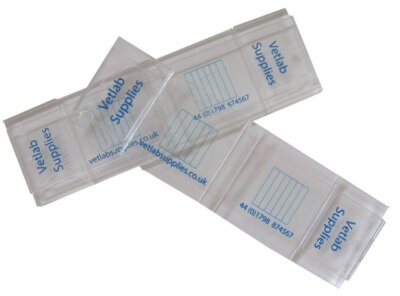
Checking the faeces of sheep, goats, cattle, horses and the UK’s growing lama and alpaca herd for tapeworm eggs is a tried and tested method for monitoring gastrointestinal parasite infestation.
McMaster Slide Faecal Egg Count Technique
Since 1939, the McMaster Slide Faecal Egg Count Technique has provided veterinary laboratories with a means of quantifying the number of parasite eggs in a faecal sample. The principle is simple and based on knowing the number of faeces tested, the volume of Faecal Flotation Solution used to suspend the sample, and the number of tapeworm eggs (oocysts) counted in the microscopic examination of a known volume of sample suspension.
By taking into account factors such as the likely uneven distribution of oocysts in a faecal sample and variation in tapeworm egg production due to season, habitat and the hormonal state of the host animal, the ‘tapeworm burden’ in the animal can be estimated.
An absence of tapeworm eggs in a single test might not mean that the host is tapeworm-free. It might be that the infestation is made up of immature parasites, or that there is some resistance in the host that is suppressing parasite egg production.
Identifying a particular parasite
With practice and experience in veterinary microscopy, the diagnostic veterinary laboratory scientist will even be able to identify the particular parasite infecting an animal by recognising the specific oocytes of Trichostrongyle, Nemitodorus, Eimeria and other invasive species.
Some gastrointestinal worms are particular to certain hosts, making FEC a useful tool in monitoring trends in animal diseases. Of current interest is Nematodirus lamae, a parasite of alpaca and other camel-related animals. This worm had not previously been seen in animals outside of South Africa, only recently being found in an alpaca in the UK.
The importance of constant faecal egg monitoring
Constant faecal egg monitoring of dairy herds, sheep and horses is important as the parasites use intermediate hosts, making complete eradication almost impossible. In horses, a grass dwelling oribatid mite can harbour the parasitic Anoplocephala perfoliata tapeworm, present in even in well-managed fields and paddocks.
Critical to accurate faecal egg counts is the Faecal Flotation Solution, which must be of the correct specific gravity (S.G. or density) to separate the parasite oocysts from the animal faeces. Because different parasites require different specific gravity solutions, Vetlab Supplies offers bespoke and off-the-shelf faecal flotation solutions in 1 and 5-litre volumes saving your veterinary laboratory time, hassle and money while increasing reliability and accuracy.

